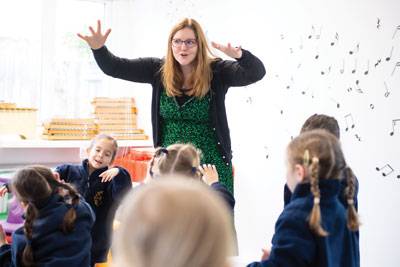
by Sarah Jones
Director of Prep School Music St Catherine’s
Head of Prep School Music at St Catherine’s, Sarah Jones, explains why she believes that music is such an important part of a primary school education. Music has been deeply woven into human culture for centuries, from the rhythmic beats of ancient drums to the intricate compositions of classical symphonies and the infectious tunes of modern pop.
For children, music is more than just entertainment – it plays a crucial role in their cognitive, social and emotional growth. In primary schools, where young minds are highly receptive, incorporating music into the curriculum provides benefits that extend well beyond the classroom. As education becomes increasingly focused on academic assessments, it is essential to acknowledge the importance of music education and preserve its place as a fundamental part of the primary school experience.
One of the most convincing reasons to incorporate music into primary education is its significant impact on cognitive development. Research consistently shows that music education enhances brain function in ways that boost academic achievement. Children who participate in music learning exhibit improved language skills, better memory retention and enhanced problem-solving abilities. For instance, playing an instrument requires the brain to decode complex symbols and translate them into physical movements, stimulating both the left and right hemispheres, which strengthens neural connections.
Additionally, music education is closely linked to improved maths skills. The rhythmic patterns in music closely align with mathematical concepts like fractions, sequencing and spatial awareness. As children practice these rhythms, they naturally reinforce their understanding of essential mathematical ideas in a fun and intuitive way.
Beyond academic benefits, music plays a significant role in supporting emotional and social development. In the early years of primary school, children are learning to navigate complex emotional landscapes and form social bonds. Music provides a safe and expressive outlet for emotions, allowing children to process feelings that may be difficult to articulate through words alone.
Group musical activities, such as choral singing or instrumental ensemble performances, encourage teamwork and cooperation. In these settings, children learn to listen to each other, maintain rhythm together and contribute to a collective goal. As well as being lots of fun, these experiences foster a sense of belonging and teach essential life skills like empathy, patience and collaboration. For many children, participation in musical activities boosts self-esteem and provides a sense of achievement, especially when they perform in front of an audience.
In an educational system with a focus on standardised testing, there is a risk that creativity might take a backseat. However, creativity is an essential skill for future success, and music education offers an ideal platform for its cultivation. Through music, children are encouraged to explore, experiment, and express their individuality. Whether they are composing original songs, improvising with instruments, or interpreting music in their own unique way, these activities promote creative thinking and innovation.
Moreover, music provides opportunities for cultural awareness and appreciation. Exposure to diverse musical traditions broadens children’s perspectives and helps them develop a deeper understanding of the world. Through music, they learn to value diversity and embrace a global outlook – qualities that are vital in today’s interconnected world.
Music education also plays a key role in developing fine and gross motor skills. For instance, playing an instrument demands precise finger movements, hand-eye coordination, and good timing. Even simple activities like clapping to a beat or dancing to music help improve physical coordination and rhythm. These motor skills are particularly important in the early years when children are honing their physical abilities.
Additionally, music and movement activities contribute to physical wellbeing. Dancing to music provides a fun and engaging form of exercise, helping to counteract sedentary habits and fostering a lifelong enjoyment of movement. This well-rounded approach to education recognises the connection between mind and body, supporting both physical and cognitive growth.
The benefits of music education extend well beyond the primary school years. Early exposure to music often sparks a lifelong passion for the arts, whether as a personal interest or a professional pursuit. Children who engage with music at a young age are more likely to continue enjoying and participating in musical activities throughout their lives.
Additionally, the skills fostered through music – such as discipline, perseverance and the ability to work toward long-term goals – are valuable in many other aspects of life. Learning to play an instrument or master a musical piece requires patience and consistent effort, teaching children the importance of hard work and delayed gratification. These lessons become essential as they grow and encounter new challenges.
Music is a cornerstone of a holistic education. Its benefits extend across cognitive, emotional, social, and physical development, nurturing skills essential for academic achievement and personal growth. In a rapidly evolving world, where creativity and adaptability are highly valued, the significance of music education cannot be overstated. By prioritising music in primary schools, we provide children with the tools they need to succeed while fostering a lifelong passion for learning and self-expression. A musical childhood is not only an educational asset – it is a gift that lasts a lifetime.
St Catherine’s Prep School extends a warm welcome to parents who would like to visit the school. Visit www.stcatherines.info to find out more about upcoming open mornings and arranging a visit.











